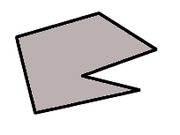Concavity
|
|
In mathematical analysis, concavity is a property of certain geometric figures, and in calculus, a property of certain graphs of functions.
Concave functions
In calculus, a differentiable function f is convex on an interval if its derivative function f ′ is increasing on that interval: a convex function has an increasing slope. Similarly, a differentiable function f is concave on an interval if its derivative function f ′ is decreasing on that interval: a concave function has a decreasing slope.
A function that is convex is often synonymously called concave upwards, and a function that is concave is often synonymously called concave downward.
For a twice-differentiable function f, if the second derivative, f ''(x), is positive (or, if the acceleration is positive), then the graph is convex (or concave upward); if the second derivative is negative, then the graph is concave (or concave downward). Points where concavity changes are inflection points.
If a convex (i.e., concave upward) function has a "bottom", any point at the bottom is a minimal extremum. If a concave (i.e., concave downward) function has an "apex", any point at the apex is a maximal extremum.
Contrary to the impression one may get from a calculus course, differentiability is not essential to these concepts; see convex.
In mathematics, a function f(x) is said to be concave on an interval [a, b] if, for all x,y in [a, b],
- <math>\forall t\in[0,1],\ \ f(tx + (1-t)y) \geq tf(x) + (1-t)f(y).<math>
Additionally, <math>f(x)<math> is strictly concave if
- <math>\forall t\in[0,1],\ \ f(tx + (1-t)y) > tf(x) + (1-t)f(y).<math>
A continuous function on C is concave if and only if
- <math>f\left( \frac{x+y}2 \right) \ge \frac{f(x)+f(y)}2 .<math>
for any x and y in C.
Equivalently, f(x) is concave on [a, b] iff the function −f(x) is convex on every subinterval of [a, b].
If f(x) is twice-differentiable, then f(x) is concave iff f ′′(x) is non-positive. If its second derivative is negative then it is strictly concave, but the opposite is not true, as shown by f(x) = -x4.
A function is called quasiconcave iff there is an <math>x_0<math> such that for all <math>x
Concave polygons
In a concave polygon, some interior angle will be greater than 180°. The extension at that vertex of the line segment making up a side will pass through the interior of the polygon.
A concave polygon is often called re-entrant polygon (but in some cases the latter term has a different meaning).
See also
convexda:Konkav de:Konkav he:פונקציה קעורה nl:Concaaf sv:Konkav

